
What is the best content length for blogs and SEO? While there’s no concrete answer to this question, the evidence strongly suggests that longer content has a higher likelihood of ranking compared to short form content.
The question then arises whether content length really is an SEO ranking factor.
In this post, we will delve deeper into the subject of SEO content length, sharing insights from several sources on what they believe to be the ideal length for blog content.
We also look into the claims that content can be too long and have a negative effect on rankings.
How Long Should a Blog Be?
The ideal length for long-form SEO blog posts is anything between 2,000 and 2,500 words. Of course, you shouldn’t just sit down and write a 2,000 word blog post just because we said so.
Instead, you should study your competitors and the top 5 to 10 results that are already ranking for the intended target keyword.
At SEOptimer, we determine our blog article length by getting the average word count of the top 10 ranking articles for the keyword we want to rank for. And then simply rounding up to the nearest 500 or 1,000.
For instance, when we created the content brief for our article on “SEO Agencies for SaaS Companies”, we found that the average word count for the top 10 results in Google was around 1,322 words.
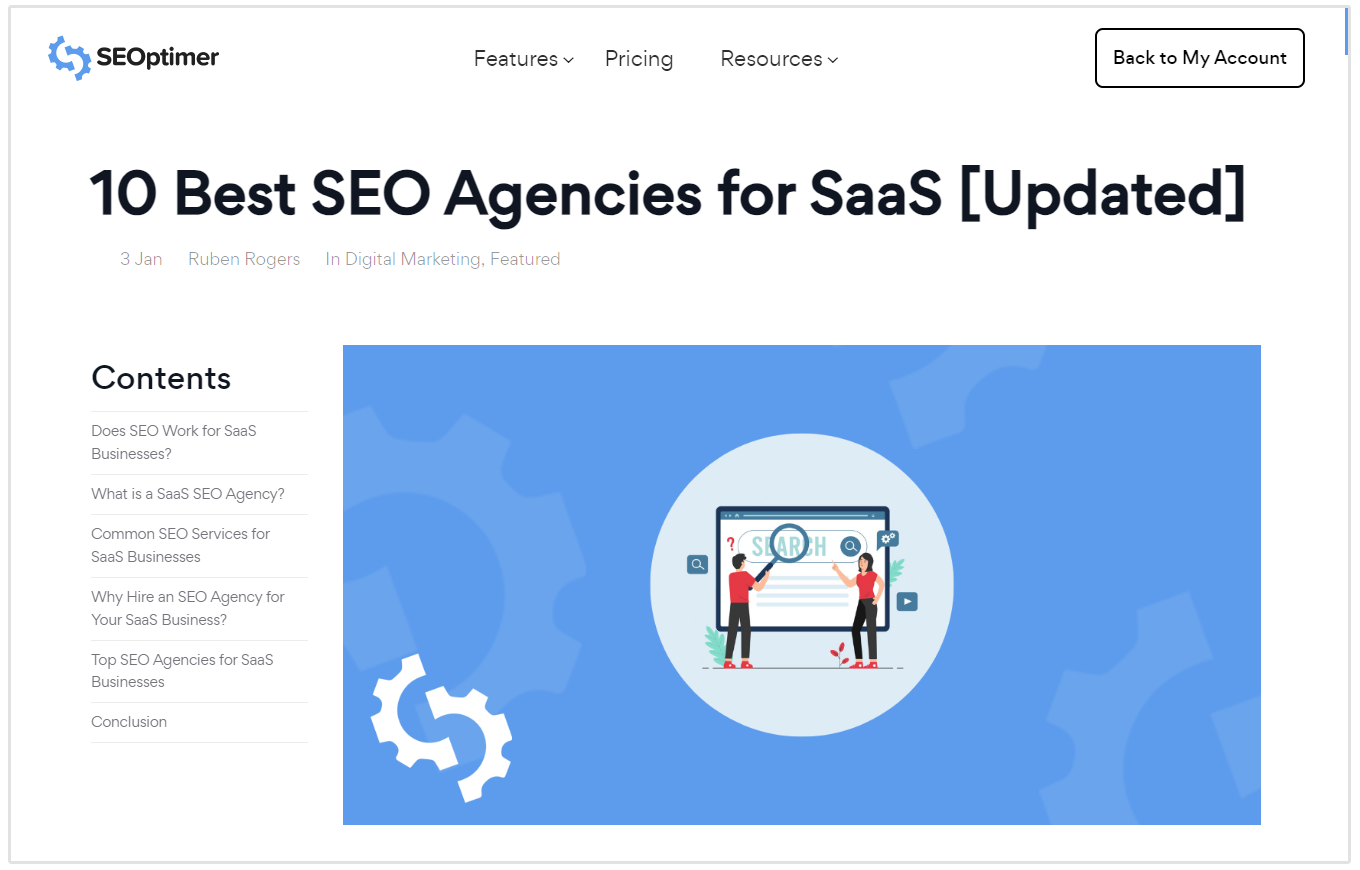
Keeping this in mind, we aimed to write a blog post of up to 1,500 words for this specific keyword.
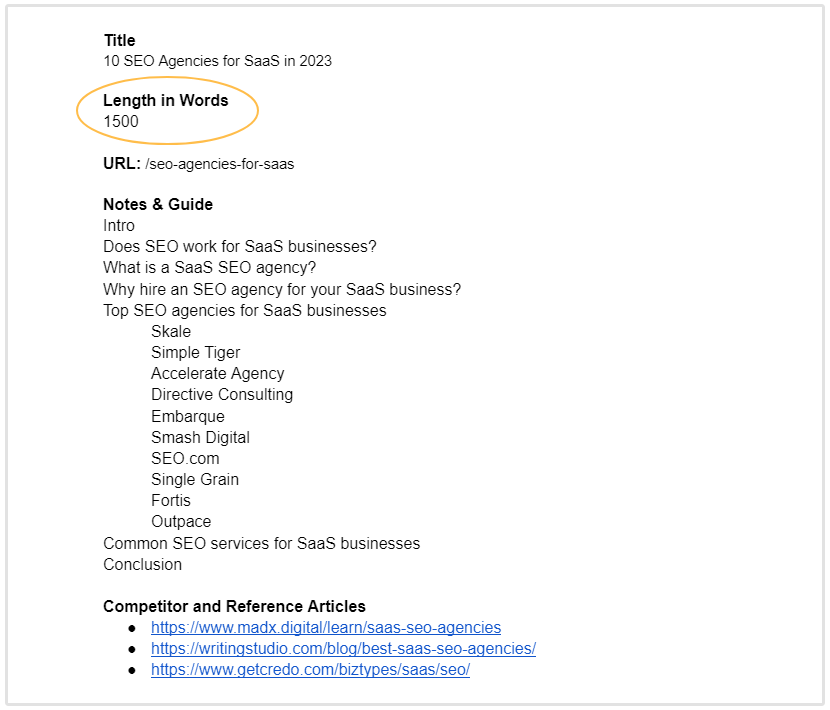
The result? The article is currently ranking in the 5th spot in Google for its target keyword.
Now I'm not saying that the content length is the sole reason for getting the 5th spot. However, by having a high word count target, we were able to pack additional information and insights which Google seemed to like.
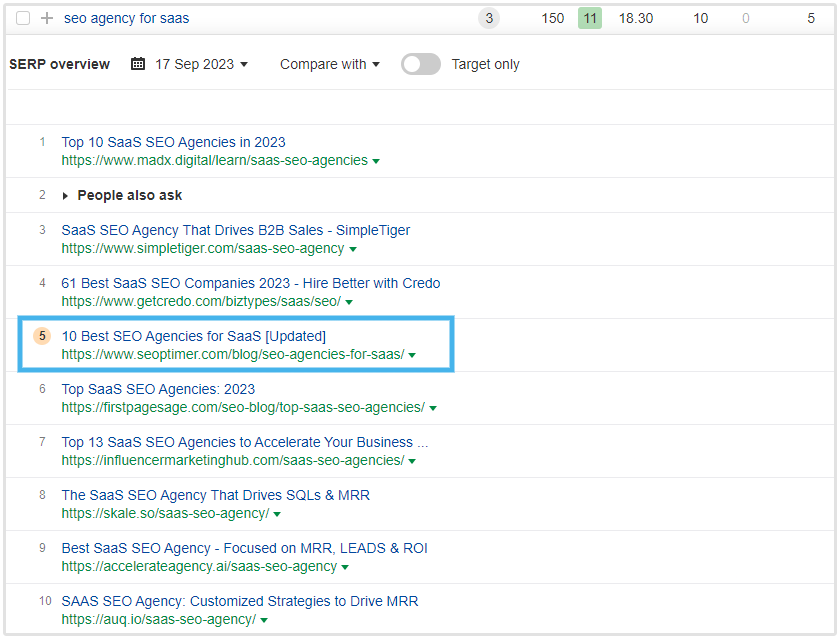
As you can see, there’s no right or wrong answer to the question of how long blog posts should be. However, there’s a process that you can follow to get a good idea of how long a blog post should be.
How to Determine the Ideal Blog Post Length
Determining the ideal length for your blog post is not solely about hitting a specific word count.
It's about creating quality content that satisfies the search intent behind your target keyword, analyzing what's already ranking, and ensuring your post is comprehensive enough for your audience. Let's break down these steps:
Step 1: Determine the Search Intent Behind the Target Keyword
Before you start writing, it's crucial to understand the search intent or the purpose behind the keyword you're targeting.
Why are people searching for this term? Are they seeking information, looking to make a purchase, or comparing different products? Knowing this can help shape the depth and length of your content.
If the search intent is informational, your blog post might need to be longer to cover the topic comprehensively.
For example, the search query "polar pacer pro battery life" will likely be used by someone that's interested in buying this watch, but wants to know its battery life and other key techinical specifications. It's likely that the pages ranking for this search query are product reviews going into detail on aspects like battery life, design, features, etc.
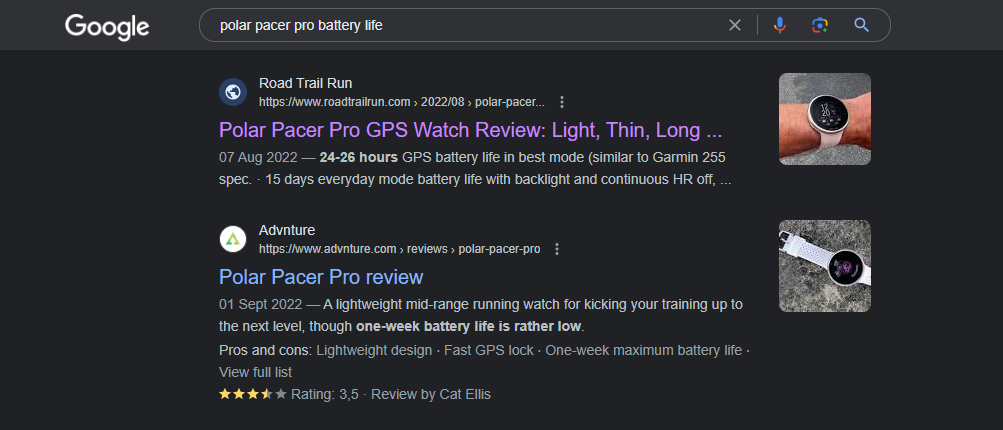
On the other hand, if the search intent is transactional, a shorter, more concise post focused on product features and benefits could be more effective.
Step 2: Analyze the Content Length for the Current Ranking Posts
Next, take a look at the top-ranking posts for your target keyword. How long are these articles?
This gives you an idea of what Google considers to be high-quality content for this particular topic. However, remember that length alone is not a guarantee of ranking. The content needs to be relevant and valuable to the reader.
Step 3: Determine How Comprehensive the Blog Post Should Be
Lastly, always write with your audience in mind. The required extensiveness of your blog post depends on the level of understanding of your audience. If your readers are beginners, they might appreciate longer, more detailed guides. If they're experts, they might prefer short, dense, highly technical posts.
Remember, the goal is not to create long content for the sake of it, but to provide value to your readers. The length of your post should serve this purpose. As a rule of thumb, make your content as long as it needs to be to cover the topic thoroughly and no longer.
Is SEO Content Length a Google Ranking Factor?
No, content length is definitely not a Google ranking factor, nor is it an indication of high-quality content.
John Mueller, one of the authorities on SEO and Google Search Advocate, says that the number of words on a page is not a quality factor, nor is it a ranking factor.
“Word count is not indicative of quality. Some pages have a lot of words that say nothing. Some pages have very few words that are very important & relevant to queries. You know your content best (hopefully) and can decide whether it needs the details.” - John Mueller
According to several studies done over the last few years, longer content seems to rank higher when compared to shorter content. Different people give different explanations as to why this may happen. Let’s get more into this.
Backlinko carried out a study to identify the factors that correlate with search results that rank on the first page.
One of their findings was that longer content ranked higher in search results. In fact, the average length of the top 10 results was 1,447 words.
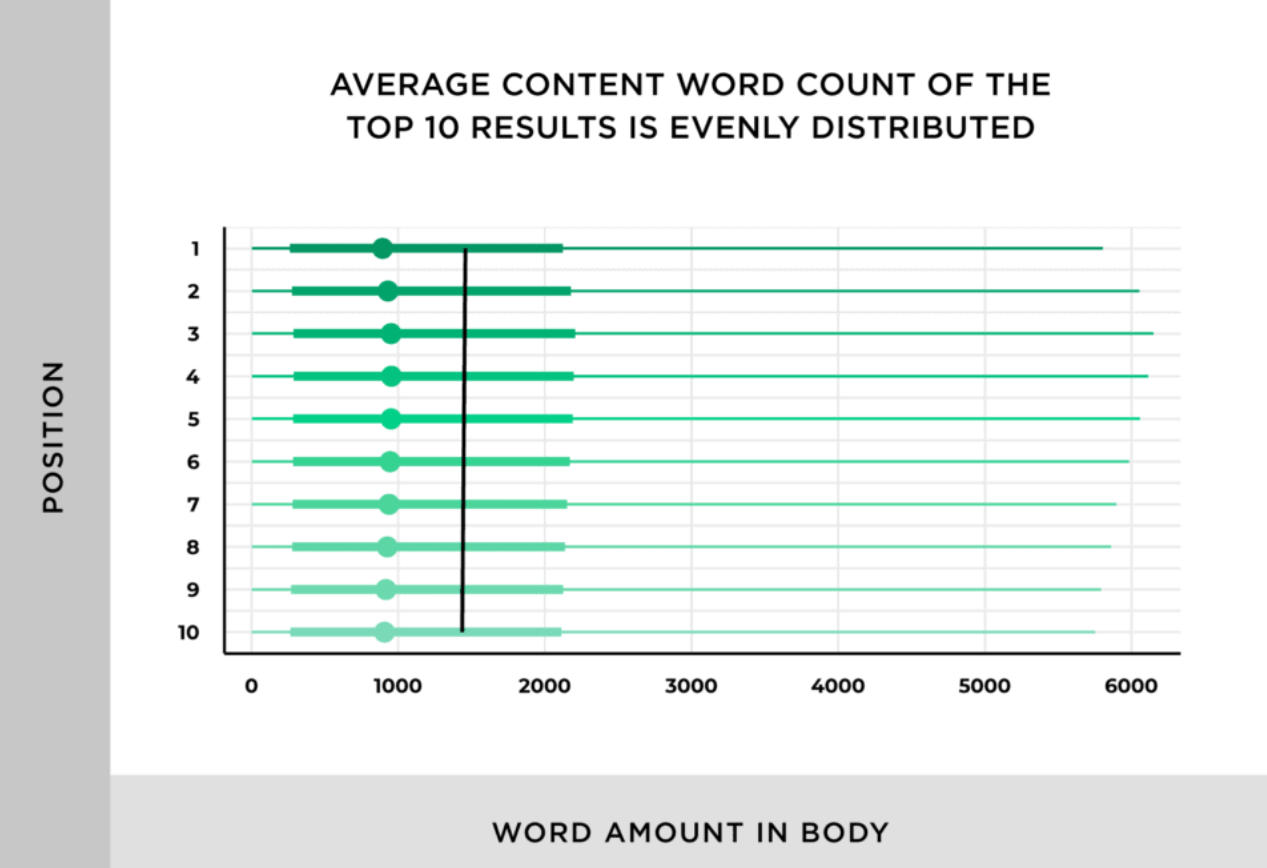
Image source: Backlinko
Content that was topically relevant was also found to rank higher than that which did not cover a topic in depth. As much as different studies have different conclusions on the word count, the general agreement is that longer content tends to rank higher.
Although content length isn’t a ranking factor, we are of the opinion that it’s a minimum requirement that merely puts you in contention for high rankings. You think of it similar to how a college degree puts you in contention for a specific job. The degree puts you in the running, however it doesn't guarantee that you’ll get it.
So then, why does longer content rank better than shorter content?
Why Longer Content Ranks Higher
There are several reasons why long-form content is better for SEO:
Relevance
There is a high likelihood that longer content tends to cover a topic in-depth, making it more relevant.
Google tends to rank content that is relevant higher, and such content also results in lower bounce rates.
User Intent
Longer content also tends to serve user intent better when compared to shorter content pieces.
If a user wants to buy fishing gear for instance, a long article that covers all the aspects of good fishing gear, where to buy, how to know the best gear to buy, and even compares different brands is more likely to serve that user’s intent compared to a shorter piece of content.
Value
The truth is that when it comes to content length, visitors may spend a considerable amount of time consuming a piece of content that is full of fluff, or that uses complex sentence structure, and redundant examples, in a bid to get the gist.
These visitors are not likely to return to that site after such an experience. The value in a particular piece of content matters.
Furthermore, content that is rich with valuable information, research, and insights, if far more likely to get backlinks from other websites. And you know the story, the more backlinks a page has, the better it’s chances of having a high ranking.
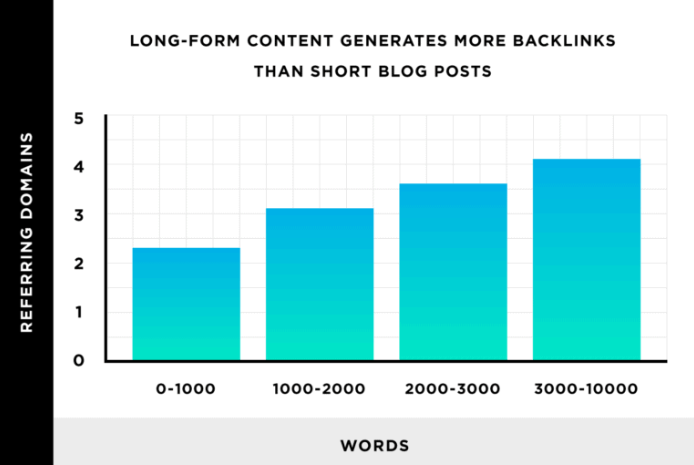
Image source: Backlinko
Goal
The purpose of your content, or its "goal," can significantly influence its length. Different goals require different levels of detail and persuasion, resulting in varying content lengths. Let's illustrate this with two common types of content: sales copy and informative blog articles.
Sales copy aims to persuade the reader to take a specific action, such as purchase a product or subscribe to a service. Given this goal, sales copy tends to be short and direct. It quickly grabs the reader's attention, highlights the benefits of the product or service, and includes a strong call-to-action (CTA).
On the other hand, an informative blog article aims to educate the reader on a particular subject.
This requires a more detailed and comprehensive approach, resulting in longer content. The goal isn't to sell directly but to provide value to the reader, establish authority on the subject, and build trust with the audience.
The goal of your content significantly influences its length.
Always keep your content's purpose in mind and tailor its length to effectively achieve that goal. Whether it's a brief, persuasive sales copy or a detailed, informative blog post, always aim to provide value and meet your audience's needs.
Can Content be Too Long?
Now, there’s also the possibility of writing SEO blog content that’s too long. When producing content, you need to think of the user first.
Well, if you write lengthy posts just for the sake of reaching a specific word count, you risk sounding redundant or adding unnecessary information that’s not helpful to the reader. There’s a fine line between writing too much and writing just the right amount of words.
Search intent is a good way to determine the ideal content length. If the search intent is centered around finding an answer to a question, then there’s no need to write a 5,000 word article.
In contrast, writing an article on how to build a website, explaining best practices, maintenance costs, comparing website builders, etc., will likely require a lot of words in order to explain these topics.
For example, our article on keyword prominence simply explains what the term is and how to optimize your pages and content for keyword prominence. The word count for this article is just over 1,000 words.
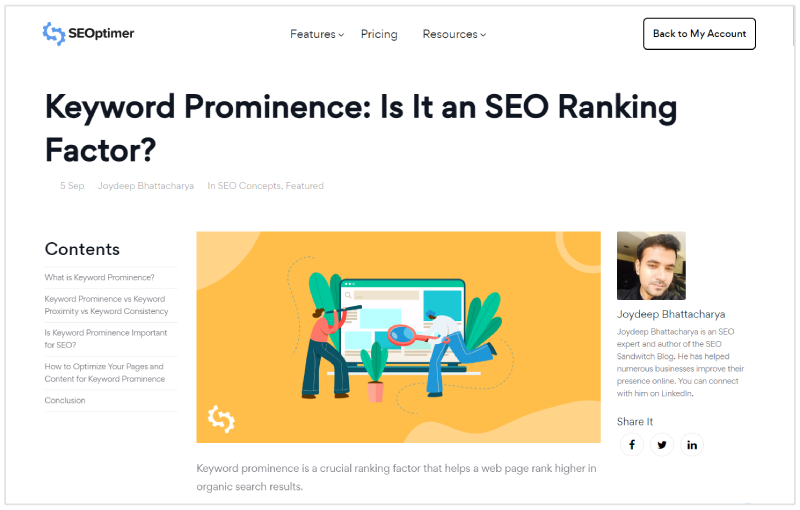
This is because the search intent behind the target keyword “keyword prominence”, doesn’t require a lengthy article to address.
Whereas our article on “9 Powerful Strategies to Get Web Design Leads for Your Agency” has a word count of more than 3,000 words since the searcher is ideally looking for an article on different strategies to get web design leads.
Conclusion
We have looked at long-form content, what it means, and why it ranks. Keep in mind that having long content is not enough on its own. Ensure that it is relevant, has value, and that the message aligns with the search intent.










